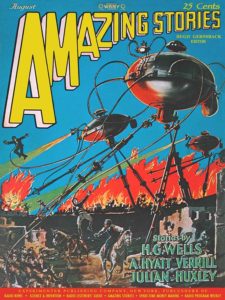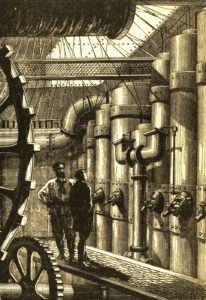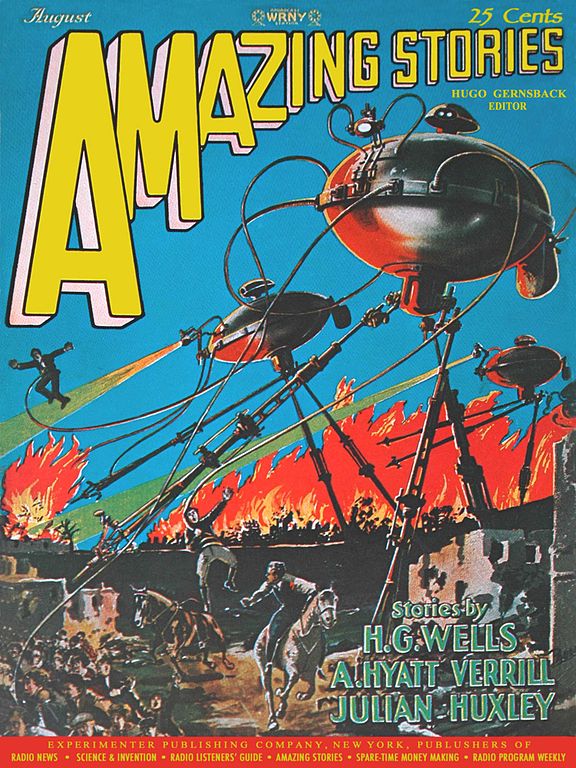Thinking About Time
 With 2015 racing to a close, I’ve been thinking about time. Which brought to mind the use of time in speculative fiction. How important is it? How does it function?
With 2015 racing to a close, I’ve been thinking about time. Which brought to mind the use of time in speculative fiction. How important is it? How does it function?
Some might automatically think of time travel or time machines. Back To The Future is one of the best known time-travel, and time machine, movies and is getting a lot of attention because it’s celebrating its 30-year anniversary.
Of course, long before that popular movie were the stories by science fiction writers like H. G. Wells and Julian Huxley involving time travel and futuristic imaginings. However, science fiction does not have a monopoly on stories that manipulate time.
J.K. Rowling utilized a type of time travel, introduced in Harry Potter and the Prisoner of Azkaban. The mechanism is an Hour-Reversal Charm, encased in an hourglass and the incident of time travel was critical to the story, but didn’t make up the story in the same way that it did in Back To The Future.
In his recently concluded Bright Empires series, Stephen Lawhead utilized what he called ley lines to allow characters to move from one time period and place to another, though the idea was actually one of traveling from different dimensions rather than back into different times. The stories read much like time travel, though, and the characters could not travel into the future ahead of their own time—an odd sort of rule if the device in question created dimensional travel.
C. S. Lewis used time differently in his Narnia stories. Time was an indicator of the fantasy world he created and operated independently from time in the “real” world. Hence, his characters could experience hours, days, even years in Narnia but return to the real world at precisely the time they left. On the other hand, they could be gone from Narnia for a year, and return to a discover that hundreds of years had passed in the fantasy world.
Lewis never gave an explanation of this, as I recall, other than that time didn’t work the same way in the two worlds. That’s a very “fantasy-ish” device.
 Science fiction involving space travel deals with the passing of time by creating ways characters can move from place to place over incredible distances. New fuels, for instance, allow ships to travel faster than the speed of light. Transporters move molecules from one place to the other in seconds.
Science fiction involving space travel deals with the passing of time by creating ways characters can move from place to place over incredible distances. New fuels, for instance, allow ships to travel faster than the speed of light. Transporters move molecules from one place to the other in seconds.
These science devices seem to focused on location, but in fact they are solving the problem of time. Unless ships could go faster than the speed of light, for instance, no one would live long enough to move from one planet to another, let alone from one star system to another.
Many speculative stories seemingly ignore time. If they are set in a fantasy world, for instance, time may be significant only because of the history of the place or because of the change of seasons as it passes.
In horror stories, urban fantasy, and the like, time is likely no different than time in the here and now. There is no different history, no manipulation of time.
 Steampunk, on the other hand, is tied to a different time:
Steampunk, on the other hand, is tied to a different time:
Steampunk works are often set in an alternative history of the 19th century’s British Victorian era or American “Wild West,” in a post-apocalyptic future during which steam power has maintained mainstream usage, or in a fantasy world that similarly employs steam power. Steampunk may, therefore, be described as neo-Victorian. Steampunk perhaps most recognizably features anachronistic technologies or retro-futuristic inventions as people in the 19th century might have envisioned them (Wikipedia)
In thinking about time in speculative stories, you might also be interested in reading “About Time,” a post from our archives by former regular contributor Yvonne Anderson, that explores a motive behind some time travel stories.
What are some of the best stories that you’ve read (or written) which depend on the manipulation of time or on a certain time period? What device (literary or physical) creates this time bending? Why is altering time such an important element?
Over all what do you think about stories that manipulate time? Give your view in the poll below. You may answer as many of the choices as you want or create another option.









































I like time travel stuff as long as it’s well done. The best are the ones where the plot folds in on itself to make everything click. Prisoner of Azkaban was a good example of this.
Philosophically, time travel requires a model of time that I find theologically unacceptable, but when it comes to the story I’m really just looking for a cleverly crafted and consistent mechanism that avoids weird instances of infinite regress or hand-waving away unanswered questions.
The Legacy of Kain video game series had some great moments, and of course TV classics like Quantum Leap and Doctor Who.
What exactly about a model for time travel is theologically unacceptable? There’s a couple of techno-babbles to pick from any given sci-fi I’ve seen, like linear, branching/multiverse-ish, or great big ball of wibbly-wobbly, so is it one or all of those with heretical potential?
“What exactly about a model for time travel is theologically unacceptable?”
Good question. And should we trust any answer even if it appears to be based on solid logic?
Science can prove that light is made up of waves. It can also prove it is made of particles. There are experiments both ways. There’s even the experiment where a single photon sent through a pair of slits can go through both and interfere with itself.
The problem is that our visualisation of any theory is inevitably simplified to the models within our heads. The true statement of wave-particle duality is something God no doubt understands fully. All we can manage are approximations. True they are very good approximations and they are getting better, but it’s quite possible we will never thoroughly understand wave-particle duality fully.
That means deductions argued from our latest model have to be conjectures, until proven experimentally.
That applies to Faster Than Light Travel, Time Travel and anything else.
How you fit together God’s foreknowledge – as shown in prophecy with our freewill and responsibility for our actions I frankly do not know. But there must be an answer.
The temptation is to deduce from the theological model in our heads, and then claim scriptural authority for it. It doesn’t work, because our understanding is imperfect (Paul points that out).
If you read church history most of the heresies and schisms started in the same stupid way.
MC, great comment. I particularly appreciate your analogy with light. It really is true that we limit ourselves by our own understanding, and much of our understanding is based on only that which we know at this time. In other words, we can’t conceive of traveling faster than the speed of light because it’s out of our experience—until a science fiction writer makes it seem believable. Then, suddenly, possibilities open up. Time is much the same.
We really don’t understand it,. What did God mean when He said a day to Him is like a thousand years?
I know for some people the idea that Noah’s grandfather was over 900 years old seems like an impossibility, too, but why do we think their bodies had to age the way ours do? Abraham’s wife Sarah was so beautify, another man, thinking as he’d been told, that they were brother and sister, wanted to bring her in to his harem. At sixty?
We are too quick to think we know things that we can’t actually know.
Becky
Yes, I thought about Quantum Leap but never watched it enough to know how to include it in this article. I was hoping someone would mention Doctor Who. I haven’t watched it, but again, have heard enough to know it also “messes with time” on occasion.
I think theology standing in opposition to time travel is one of the reasons some Christians reject speculative fiction, but for me it is just one more imagined device that isn’t real and therefore can be enjoyed for what it means to the story, not what it means to life or to eternity.
Becky
Connie Willis’s Oxford Time Travel books are brilliant. (I haven’t read all of them yet, but I will.) They follow a group of historians who travel back in time to study history, and inevitably wind up getting enmeshed in all kinds of problems with their time machine and the general historical continuum. I think my favorite thing about the time travel mechanics of her books are just how down-to-earth they are. They’re fiddly, not fully understood, and liable to act strangely. Time travelers have a tendency to experience “time lag” and run the risk of tampering too much with history. It winds up feeling very real. If time travel actually existed, this is the sort of awkward, unromantic system I can imagine it being.
The brilliance of Willis’s books comes in how she melds those down-to-earth fiddly details with complex, abstract metaphors. The machinations of the time-space continuum become a symbol for God’s providence in To Say Nothing of the Dog; stranded time travelers and technical problems turn into a representation of the Incarnation in Doomsday Book. In the end, her metaphors feel as real as her time travel. It is beautiful to watch. Who knew you could get such a sense of wonder out of malfunctioning electronics and overloaded phone systems?
Sounds like an intriguing series, sheesania. I need to check them out. Great to be surprised by a sense of wonder, isn’t it? That’s what C. S. Lewis found, too.
Becky
Time travel is one of my favorite spec-fic tropes (imagine my giddy joy at discovering the wonderful world of Doctor Who last year). To me, it brings a lot of potential conflict and intrigue to a story, and can overlay powerful themes on the story itself. With time travel, the possibilities are endless, and that appeals to my highly imaginative side. Plus it raises some fascinating questions. What if you could go back and change the past? What if you could, a la Scrooge, see into the future and alter your course to avoid an undesirable fate?
I’m actually posting a time travel story on my blog right now. The main premise deals with going back in time to change a horrible, life-altering event. I tried to approach it from a personal standpoint. We’ve all done things we regret, but what if you had done something terrible…and then had the chance to go back and change it, to not live with the anguish, the burden, the regret? What would that look like? In a way, it becomes a redemption story.
I’m not a big sci-fi fan, Zac, so I haven’t read many time travel stories (Any?) But I loved Star Trek, especially the newer ones—Next Generation, Deep Space Nine, Voyager, and even Enterprise. Inevitably there were episodes that touched on time travel or had time travelers visit. So I got a feel for the stories. I remember one in which the characters were caught in a time loop and kept experiencing the same day (which ended in their destruction) over and over.
I did find the stories interesting, but in the end, pretty much nothing changed. Often people couldn’t remember that they had gone into the future or whatever. That’s the thing I objected to most—I’d watch a story and it’s conclusion seemed like a great, Never mind. Sort of like stories that are really dreams and not real events in the character’s life.
But again, this is not from my reading. I’ve just never been drawn to time travel stories. What surprised me was to realize that a number of fantasies also use a form of the device. That was not something I’d anticipated!
Becky
Obligatory Doctor Who question: Which Doctor is your favorite? Which companion?
Second obligatory Doctor Who question: Seen any Classic Who, or do you just catch what they rerun on PBS next to the other British imports?
Favorite Doctor: Eleven. Companion: River Song, Sarah Jane, Evelyn Smythe (audios).
And yes, I’ve seen all the tv episodes, classic and new. Right now I’m binging hard on the audio dramas, comics, and tie-in novels
Zachary, love the idea of redemptive time travel!
I remember an interview with Patrick Steward and he mentioned the time travel episodes were some of Star Trek’s best ones. If there’s a good reason for time travel, I’m all for it.
One of Frank Peretti’s newer novels, Illusion, deals with some time travel. It’s excellent! A little hard to figure out at first that he’s doing time travel because he handles it in a fresh way (but that’s Frank Peretti, huh?) It’s an excellent story!
Becky, I appreciate CS Lewis’ use of time in the Narnia series because it made time God’s creation and His Providence, uncontrollable by human hands. How true is that for our lives, too!
I like the idea of being able to go back in time and undo things we regret we’ve done. However, like many time-manipulation stories, the change might unleash a firestorm of unintended new consequences. Playing God is risky business. A story of that kind – a la Zachary’s idea – could make some interesting theological points.
That’s the joy of writing Christian spec fiction. I did slog my way through Lewis’ sci-fi stories but they didn’t touch my heart the way the Narnia Chronicles have. I do enjoy a lot of Enclave Publishing’s sci-fi and fantasy stories.
Thank you for this post. It has me thinking about the use of time in my WIP urban fantasy. I like breaking rules! 😉
Happy New Year!
Karen
I guess the undoing aspect of time travel is the part that seems off to me. I mean, what if Adam and Eve could go back and not commit the original sin? Then we’d have a different way of salvation, something humans did or could do on their own apart from Jesus Christ. In fact, what if all of us could undo the sins of our heart and our actions. Would we still be sinners?
There’s where the theology can be a stumbling block to time travel, I think.
But this is an interesting discussion, I think. I should have asked how many people are writing time travel stories.
Becky